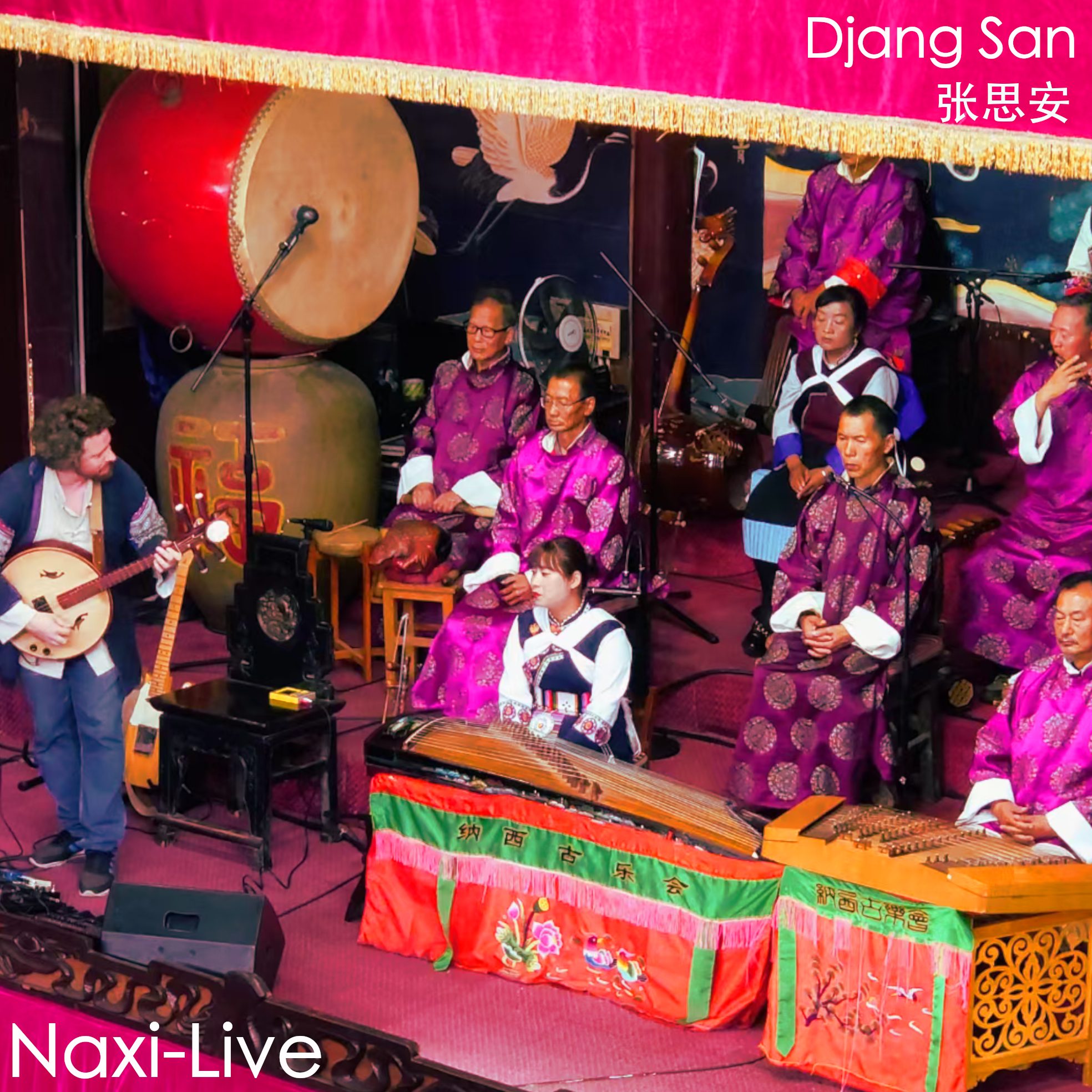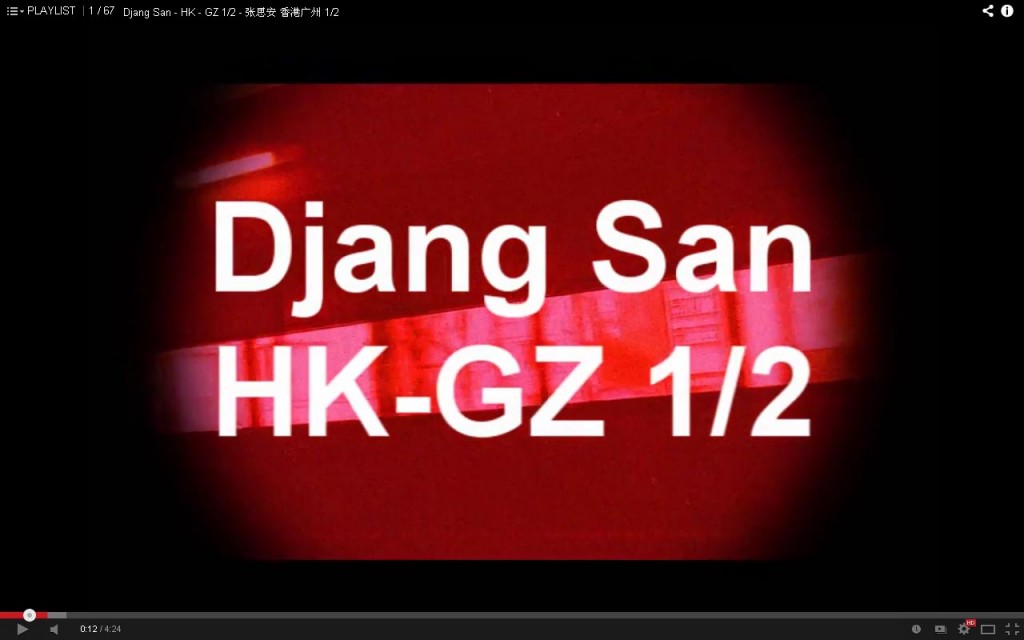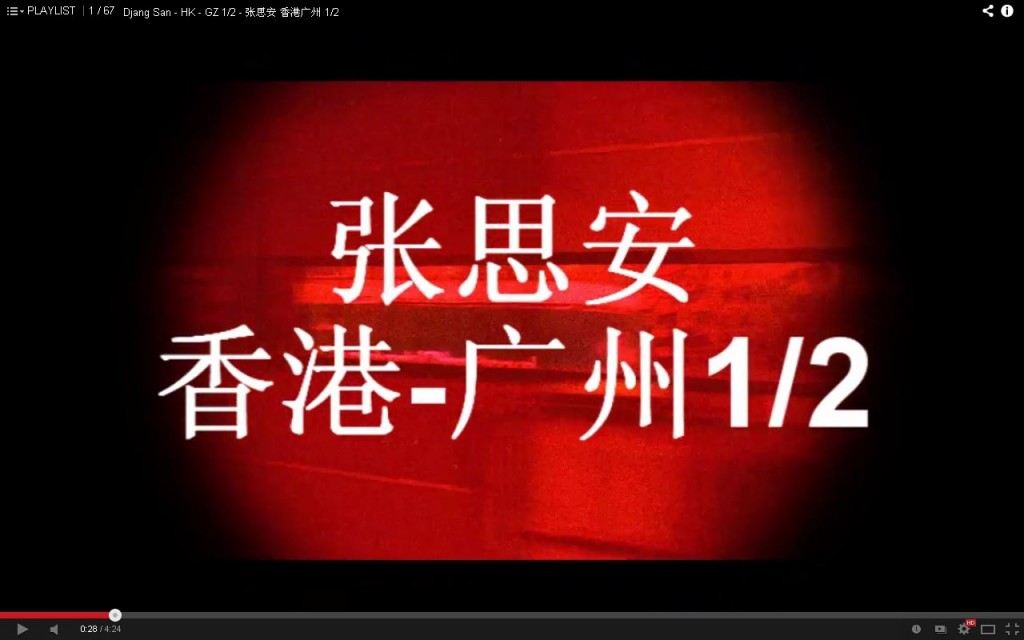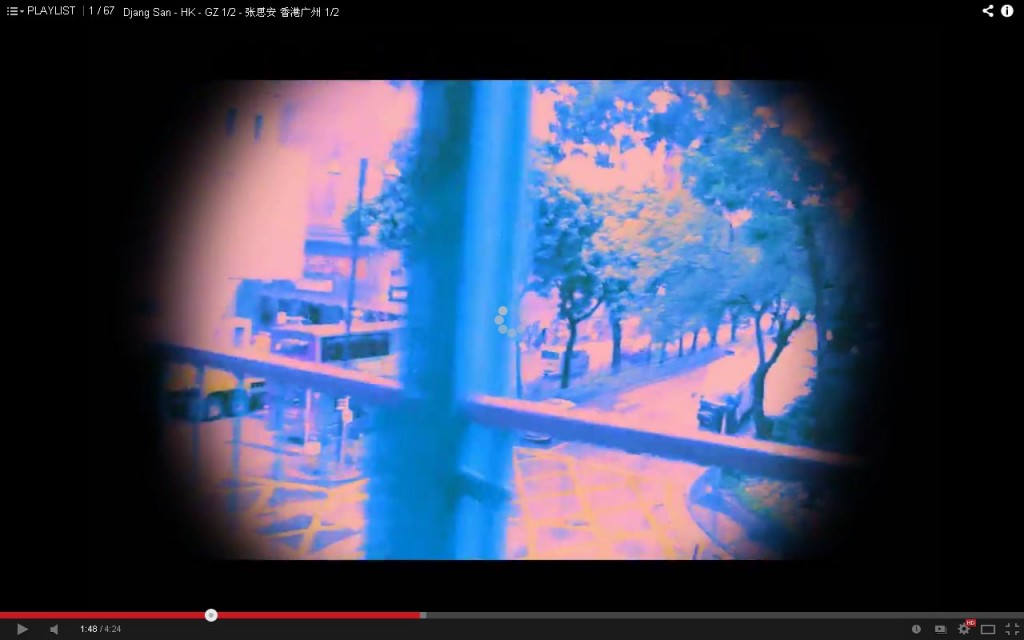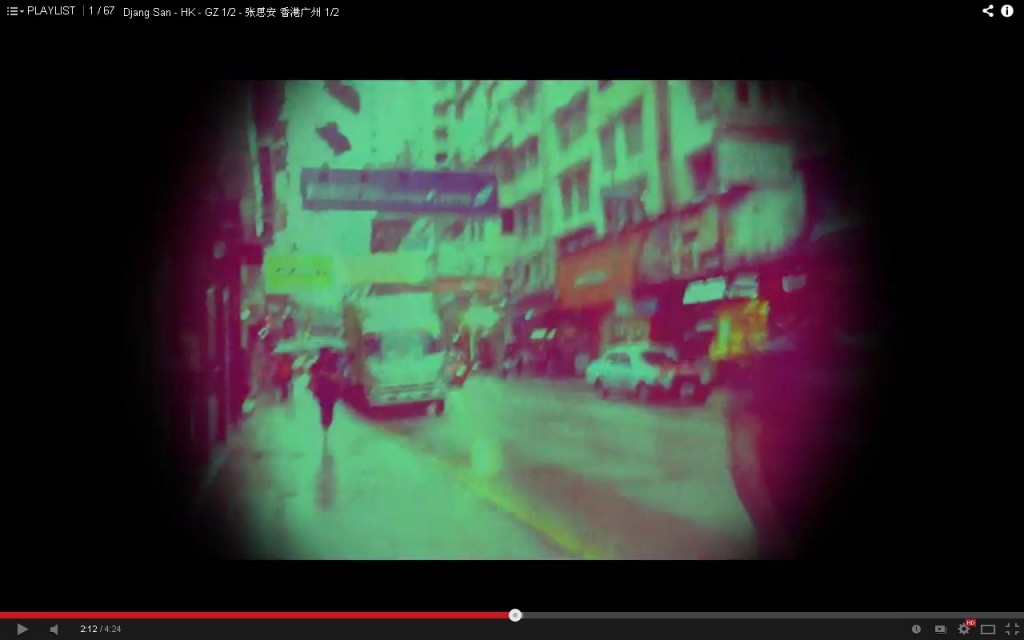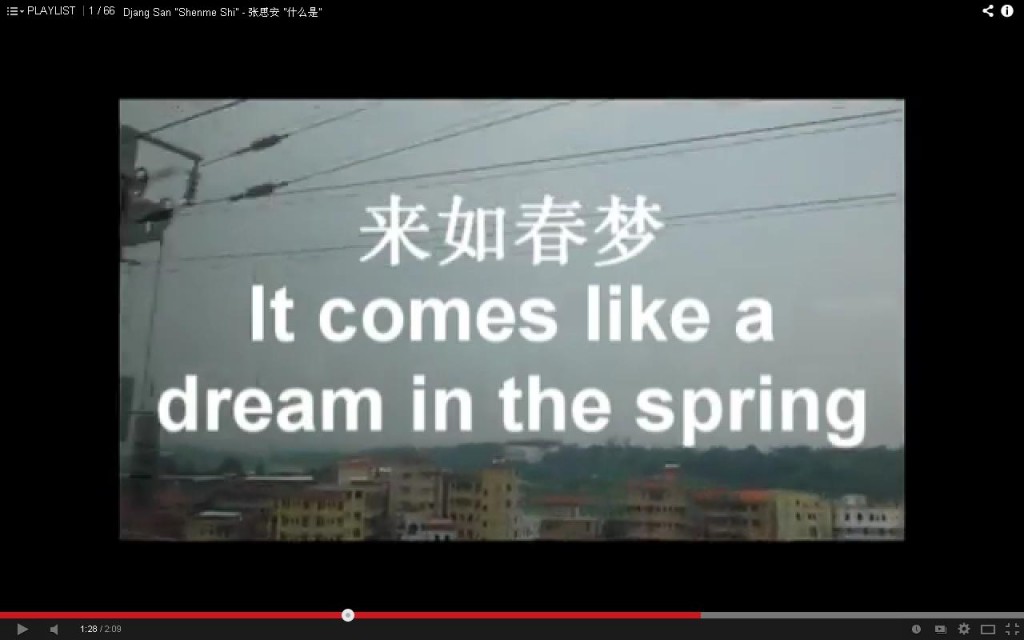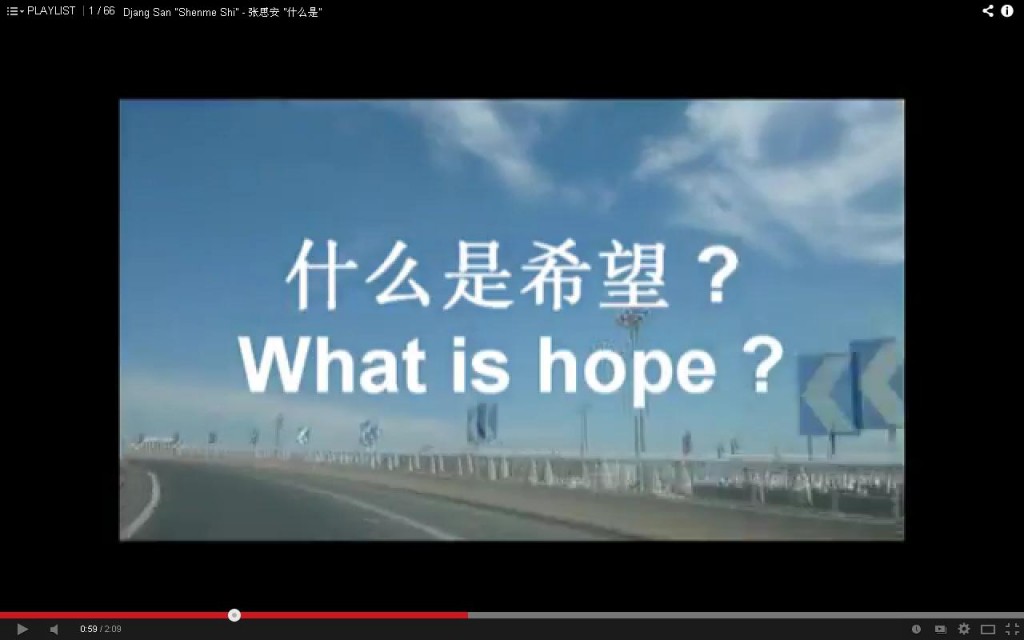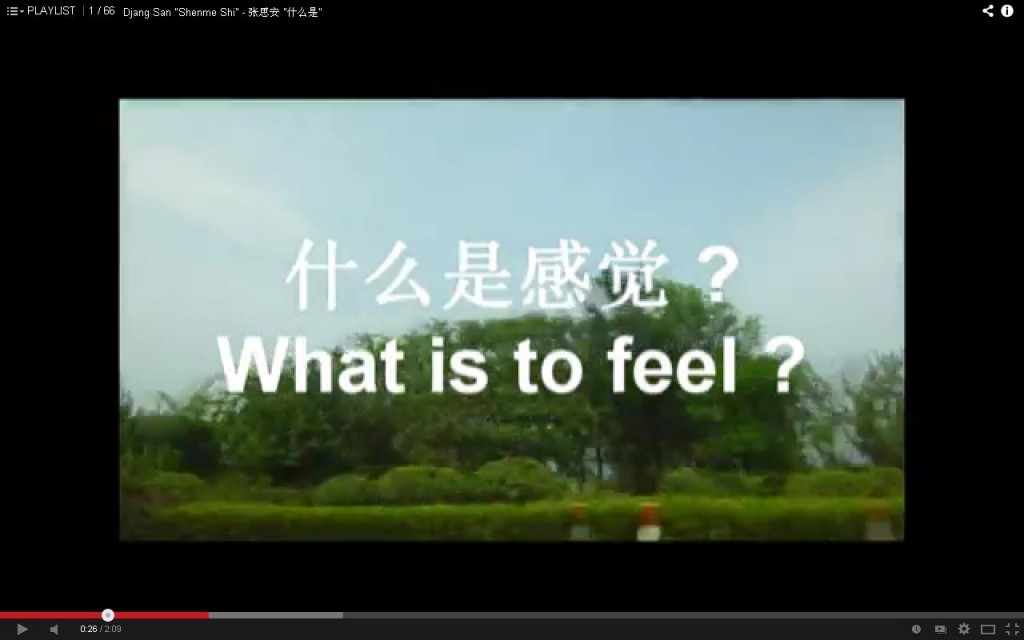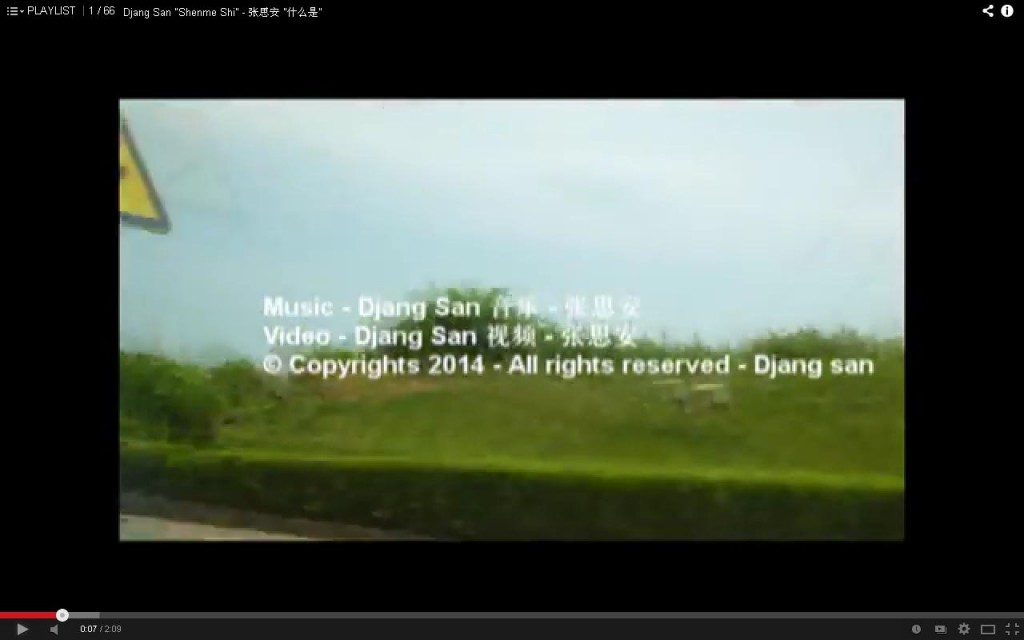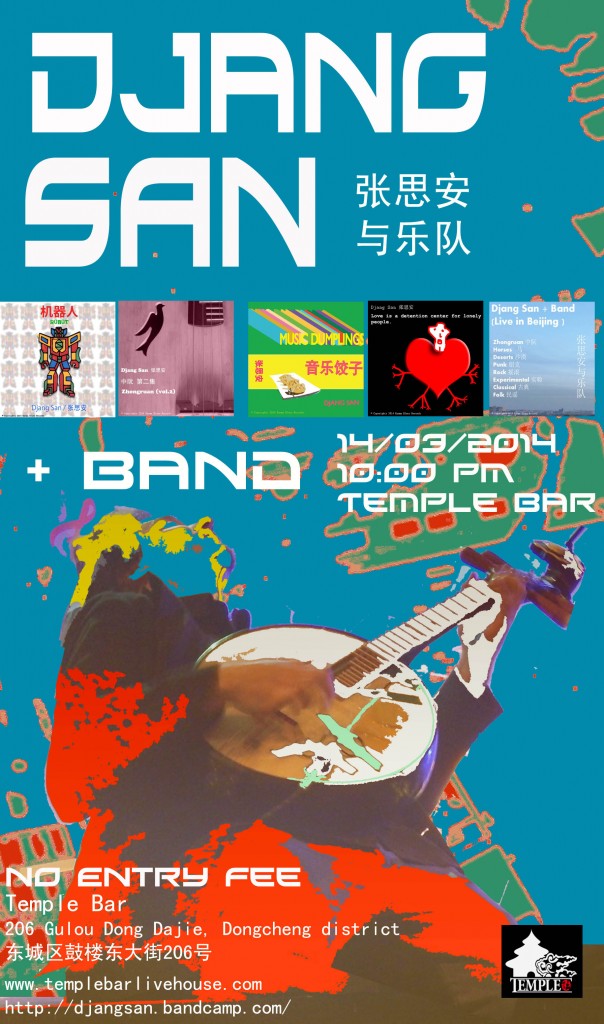HK-GZ 1/2 香港-广州 1/2 — What am I, what are you ? Existentialism and Chinese Poetry.
HK-GZ 1/2: A psychedelic trip from Hong Kong to Guangzhou, in the spirit of the old Wong Kar Wai movies.
On Youtube: http://youtu.be/nLAONtuL2Ak
On Chinese internet Tudou: http://www.tudou.com/programs/view/vx-Skjvl_Dk/
Shenme Shi “什么是”: An existential questioning mixed with ancient Chinese poetry.
In the end, we’re all humans, and we all have the same questions.
On youtube:
http://www.youtube.com/watch?v=p_KUz0MJ7CY&list=UUoHsXANCQsAFSzaGolFJYug&feature=share&index=1
On Chinese internet, Tudou:
http://www.tudou.com/programs/view/oJGN68cK1AQ/
A few of the interviews published lately:
http://www.cityweekend.com.cn/beijing/articles/mag-bj/beat-bj/the-beat-immediate-release/ 
The Beat: Immediate Release (by Blake Stone Banks)
 Tell us about the video for “Music Dumplings”. How did this come about? The idea for the “Music Dumplings” video came from a talk with my friend Sébastien Mahon about creating a video to announce my new albums. He wanted film me on a white background and add effects behind me in post production. I had the idea for the mask and the instrument. I wanted to create some sort of character that could represent me and my music, without it being my face again. We went to several spots in Beijing including Chaoyang Park and also used the sky as an empty background for effects. The result is a psychedelic vision of Beijing. You often sing in Mandarin and even play the zhongruan in several tracks. What role does integrating local language and music play in your work? The idea of singing in Chinese came to me before my first time in China in 2000. I wanted to do something different. I wanted to immerse myself in another culture and see to what extent I could change myself through that. I perhaps was one of the first foreigners to try writing Chinese songs in such a personal way. I also used ancient Chinese poetry in some of my music. I like the idea of taking something ancient and making it contemporary, bringing the past back into the present. At that time, I was looking for local instruments to use in my recordings and write music with. I bought my first Zhongruan around 2001, and later added a hulusi, different kinds of flutes like the suona, and an instrument from Xinjiang called the “rawap”. I recorded one track with the “rawap” on Lotus album. What are your goals for Djang San in the Year of the Horse?I will play for the Croisements festival in April, as well as for the X-Nights festival. I hope to record more music, play more festivals in China, in Europe and the rest of the world. I will continue as a solo act as Djang San, as a trio with Djang San + Band, and might play again with The Amazing Insurance Salesmen again if the right opportunities come along the way. I also DJ as DJ 3San and play some jazz here and there.
Tell us about the video for “Music Dumplings”. How did this come about? The idea for the “Music Dumplings” video came from a talk with my friend Sébastien Mahon about creating a video to announce my new albums. He wanted film me on a white background and add effects behind me in post production. I had the idea for the mask and the instrument. I wanted to create some sort of character that could represent me and my music, without it being my face again. We went to several spots in Beijing including Chaoyang Park and also used the sky as an empty background for effects. The result is a psychedelic vision of Beijing. You often sing in Mandarin and even play the zhongruan in several tracks. What role does integrating local language and music play in your work? The idea of singing in Chinese came to me before my first time in China in 2000. I wanted to do something different. I wanted to immerse myself in another culture and see to what extent I could change myself through that. I perhaps was one of the first foreigners to try writing Chinese songs in such a personal way. I also used ancient Chinese poetry in some of my music. I like the idea of taking something ancient and making it contemporary, bringing the past back into the present. At that time, I was looking for local instruments to use in my recordings and write music with. I bought my first Zhongruan around 2001, and later added a hulusi, different kinds of flutes like the suona, and an instrument from Xinjiang called the “rawap”. I recorded one track with the “rawap” on Lotus album. What are your goals for Djang San in the Year of the Horse?I will play for the Croisements festival in April, as well as for the X-Nights festival. I hope to record more music, play more festivals in China, in Europe and the rest of the world. I will continue as a solo act as Djang San, as a trio with Djang San + Band, and might play again with The Amazing Insurance Salesmen again if the right opportunities come along the way. I also DJ as DJ 3San and play some jazz here and there.
Interview on Simul Radio, by Emily:
Review of “Music Dumplings” on Music Dish China, by Suzanne Li:
Music Dumplings: A Melting Pot Of Heritage Djang San’s “Musical Dumplings” offers 10 new tracks of varying musical influences that ultimately blend together to offer profound insight into the artist’s heritage
Djang San 张思安 recently released a new album called “Music Dumplings 音乐饺子”, undoubtedly whetting music enthusiasts’ appetites for his unique brand of diverse artistry. The musician has multiple personas he has gone since his first visit to China in 2000. Born Jean-Sébastien Héry in France, he was called Zhang Si’an upon his arrival, which functions both as a phoneticized version of his birth name and according to Djang San, an accurate description of his personality: “si” represents thinking, while “an” means calm. These qualities are reflected in Music Dumplings, along with the musician’s ties to both France and China.

Djang San starts the album off with the almost titular track “Music Dumpling”, an instrumental electronic offering that anchors itself with a strong beat in the background, while experimenting with different sounds and instruments. It nicely sets up the mood for the rest of the album with its rich blend of sounds, as the artist has taken care not to craft each “music dumpling” the same way. While some tracks, such as “Music Dumpling”, “Cow Street”, and “Hainan Haikou” are devoid of words, others contain snippets of conversations, like “On The Shores Of TsingTao” and “Strange Night In Beijing”. Both manage to evoke feelings of actually strolling along the named cities with the artist thanks to the inclusion of verbal cues. The former is particularly effective at conveying a slice of life due to Djang San’s use of sounds of bowls clinking and woodwork. Vocals appear on “She Wants Everything” and “Shen Me Shi (Hua Fei Hua)” in English and Mandarin respectively. Djang San takes a softer acoustic approach to these tracks, which further differentiate them from the other offerings on the album. It is interesting to note that “Shen Me Shi” also acts as a cultural tribute of sorts, as its lyrics are based off a poem by Bai Ju Yi of the Tang Dynasty. Ending the album is a track titled “HK GZ ½”, which nicely ties together the incredibly diverse “Musical Dumplings”. The song opens with an attendant asking Djang San questions in English on his way from Guangzhou to Hong Kong to visit a friend. She inquires about his current city of living and his nationality, to which he replies “Beijing” and “French” respectively. “HK GZ ½” also closes out with a message about the unfortunate delay of the train in Cantonese, Mandarin, and finally, English. Ultimately, while “Musical Dumplings” features tracks that contain a variety of influences like electronic, folk, and rock, it all exists on the same album to serve as a poignant summary of Djang San’s background and snippets of his life in China.
Parallel Planets, by Jofer Serapio:
http://www.parallelplanets.com/2014/01/djang-san-bringing-culture-back-to-life.html
It was in 2000 when Djang San first came face-to-face with Beijing’s underground music scene. It was, to him, like a page out of a Lewis Carroll book, except characters like the Mad Hatter were replaced by great bands and artists like Wild Children, Second Hand Rose, Xiaohe, and Wan Xiaoli, among others. A year later, he decided to stay in Beijing, taking to the River Bar as his own personal concert hall every Wednesday night. That was until the bar’s demise in 2003. He soon returned to France but his love affair with China’s music and culture only grew stronger, culminating in his first Chinese album, Lotus. Lotus was inspired by a trip to Lanzhou where he climbed the Lotus mountain, Lian Hua Shan, to listen to the songs of a local ethnic minority. Thus, the album includes a sample from the people living on Lotus mountain, the titular song itself.
His next albums, Is it China and Naixin, took ancient Chinese poetry and combined it with his personal style of music. The song Tianjing Sha Qiu Si from Naixin takes inspiration from a poem written by poet Ma Zhi Yuan during the Yuan dynasty. Likewise, Jianlou House from Is it China corresponds to the poem Lou Shi Ming, which was written by poet Liu Yuxi during the Tang dynasty. According to Djang San, the idea behind Is it China was to create a synthesis of ancient Chinese music and culture and modern Western music through Chinese musical instruments such as zhongruan as well as the more mainstream trifecta of the guitar, bass, and drums. On the other hand, Naixin is more acoustic, relying solely on the guitar and zhongruan combination. Unlike Is it China,Naixin was more influenced by blues and electronic music.
Ever moving forward, Djang has no intentions of taking it slow. He has plenty of projects to keep him and his fingers busy. An extension of his one-man band, Djang San + Band is a folk-rock-jazz trio organized around the zhongruan, with an expansion to electronic music clearly underway. There’s also The Amazing Insurance Salesmen, Djang San’s rock band in Beijing. They won the Global Battle of the Bands in mainland China and Hong Kong in 2010 to 2011. Their competition? Oh, only about 100 other bands.
Djang admits to having great interest in making his own music videos, although he sometimes ask friends who are more experienced in the field to help him out. He loves the idea of marrying music with film, so much so that he plays shows with his videos as the background setting. These are videos he films himself, mind you, things that catches his eye, things that inspire him and his music, things he lives and breathes. Read on to my interview with Djang San and learn more about the story behind his Chinese name, what instrument became his trademark, and his many bouts with identity crisis. Ladies and gentlemen, Jean-Sébastien has entered the building.
Parallel Planets: Tell us something about Zhang Si’an as a musician and before you became one. Djang San: “Zhang Si’an is the name I got in China when I came the first time in 2000. I was studying Chinese at Beijing Capital Normal University. “Si” means to think, and “an” means peace/security. This name is both a phonetic transcription of my French name (Jean-Sebastien) and a reflection of my personality. I studied violin as a kid and started playing guitar at 16, one year after I started studying Chinese. I think I have always been attracted to music ever since I was a kid. I remember being obsessed with rhythm in music. I was always a musician. It’s just that for a long time I didn’t accept it. It’s only now that I accept it.” Parallel Planets: What defines your artistic style? What are your “trademarks”? Djang San: “Since I started writing songs, I have always wanted for my music to be a reflection of my life. I was a lot into rock music when I started playing electric guitar at 16, but then I started using Chinese lyrics from 2000 and mixed more and more different genres of music and used more and more Chinese instruments, ancient Chinese poems, etc… One of the things that has become my trademark is playing the zhongruan. When I started playing that Chinese instrument, and still now, a lot of Chinese people ask me if the instrument is actually from China. A lot of culture and interest for culture has been lost during the cultural revolution and playing this instrument makes me feel like I am bringing it back to life. When I started playing the zhongruan, no one seemed to be interested, but now I see more and more Chinese people and musicians being interested by that instrument. Also, I was the first to use jazz technics on that instrument, as you can hear it on my versions of Take the A train, Summertime, and Caravan.” Parallel Planets: What influences your work? Who inspires you? Djang San: “I think I find influence everywhere, from the streets of Beijing to my travels, in my past, in the news, and of course in other music. I feel inspired by people like Frank Zappa, who was able to play so many styles of music and not be so serious about it. Thom Yorke and Radiohead are people I admire too, people who have been able to reinvent their music over time in such a beautiful way. I admire people who are looking for the truth and are trying to live their lives in a true way. I feel inspired by people who are trying to look beyond the frame of the picture, beyond what is shown to us as what should be accepted or considered as a standard. I can cite many other names of musicians such as Jimi Hendrix, Kraftwerk, Nirvana, Joy Division’s Ian Curtis, Jimmy Page, Grant Green, George Gershwin and many more.” Parallel Planets: You first came to Beijing in 2000, right? What made you decide to stay? What attracted you to Beijing in the first place? Djang San: “I came to Beijing through my university in France while I was studying Chinese in Bordeaux. I came to Beijing for Chinese lessons in the summer of 2000. At that time I discovered the Beijing music underground with bands such as Second Hand Rose, Wonderful Pharmacy, the Wild Children, Brain Failure and artists such as Wang Juan, Xiaohe, Wan Xiaoli, Song Yuzhe… It really is the music that made me come back and stay in Beijing. I came back in 2001-2002 and took a year off from my studies at my university in France. I then deepened my discoveries of the Chinese underground in venues such as the River Bar, the CD Cafe, the what bar, and the get lucky bar. I remember being really surprised by what I was seeing and hearing, having the feeling to be privileged to notice such different and interesting music. I felt that this music would have a great future, that things would change for the better as well. I started singing and playing guitar at the River Bar every week, and started to write songs in Chinese, in the way the other Chinese guys in the Beijing underground were writing songs in Chinese. I think I was one of the first to do that here… There wasn’t so many foreigners back then in China. It was a different country than it is now, with different hopes and needs, and there wasn’t as much money as there is now, so things were very different.” Parallel Planets: What project(s) are you currently working on? Djang San: “I’m working on three new albums. The first release will be like the two sides of the same coin. It will probably be one album divided in two, and then another one will come out. The music will be a bit different than what I usually do, but not so different, like an evolution from what I have already been doing. I am also working on videos for those albums.” Parallel Planets: In this planet that we are thriving in— What is your power animal? “My power animal is the squirrel…. No really I never thought about this.” Who is your alternate ego? “Well, it’s simple: my alternate ego is Djang San, and I am Jean-Sebastien, but I am also The Amazing Insurance Salesman, and The Incredible JSB, it depends on the hour of the day. Why? Because I’m several persons in one.” Parallel Planets: In an alternate universe where jazz does not exist— What would your name be? “My name would be Guillaume, I would be an insurance salesman or a logistician. Guillaume is my second name. My father named me after him, I have the same name as him, which led me to a lot of identity crisis, that is why I tried so many times to change my name, I still don’t know what my name is actually. I’m still looking for a name, any ideas?” What would you be doing instead? “I have two master degrees, one in international relations with Asia, one in supply chain management. If jazz had not existed, there would be no rock ‘n roll, and there would be no Djang San.”
Upcoming concerts:
I will be playing for the X-nights festival on the 10 of April at Yugong Yishan, openning for a few great artists including former Noir Desir guitarist Philippe Teyssot-Gay.
I will also play for the Croisement festival in April, more on that soon.
I will probably be at the Hanggai music festival this year again. Last year I have recorded there one of the recordings I am the most proud of, thanks again Lawrence, Carlo, and Steno for that. Listen to it here:
http://djangsan.bandcamp.com/album/djang-san-band-live-in-beijing
By the way you can download that one for free, click on “buy” and when asked how much you want to pay, say “0” and you’ll get it for free.
Of course you can pay for it, but the choice is yours.
